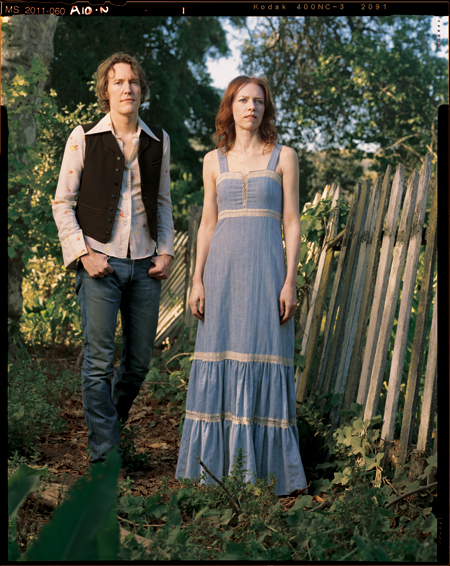Videos by American Songwriter
(photo by Mark Seliger)
Gillian Welch and David Rawlings are driving through western New Mexico, headed back to Nashville after a busy weekend on the West Coast. Welch sits behind the wheel, speeding, while Rawlings rests in the back, trying to shake the cold he picked up somewhere in California. Up ahead are 1,300 miles of interstate separating the duo from their Tennessee home.
Most of the songs from The Harrow & The Harvest, Welch’s first album in eight years, were written on cross-country road trips like this. If the two head north on US-491, they’ll eventually hit Glenwood Springs, Colorado, where Rawlings wrote the chorus for “Hard Times (Ain’t Gonna Rule My Mind)” in a hotel room. Several hours behind them is the ski lodge in Brian Head, Utah, where the lyrics for “Tennessee” were finished.
Those tunes are still new, and neither musician has spent much time talking about them with other people. Like the songs’ deliberate, mid-tempo pace, Welch and Rawlings speak slowly, confident with their answers but careful with the delivery.
“It’s ok,” Welch laughs halfway through the halting conversation. “We just passed Gallup, so there’s still 20 hours to go. We’ve got more than enough time to get our answers straight.”
Despite barreling down I-40 at 82 miles per hour, Welch is a strong believer in taking her time. The near-decade that elapsed between The Harrow & The Harvest and her previous album, Soul Journey, wasn’t the product of writer’s block, she says, as much as “writer’s dissatisfaction.” Working with Rawlings, her guitarist and harmony vocalist since 1996’s Revival, she churned out song after song during the years following Soul Journey’s release. Most of them were articulate folk ballads, filled with close harmonies and tangles of acoustic guitar. All but one, “The Way It Will Be,” were thrown out.
Don’t mistake Welch for a perfectionist. Her albums are the stuff of spontaneity, filled with first takes and virtually absent of overdubs. In concert, she shares a single microphone with Rawlings, both of them leaning their heads together to harmonize. Albums like The Harrow & The Harvest take their cues from Appalachian traditions that thrive on storytelling and conviction, not precision, and Welch structures her own songs accordingly. Still, the songs had to be good – damn good – to earn a space on her fifth album.
“I think other people would’ve put out a couple of records during that gap,” she says. “We had enough songs to do that, but we just didn’t like the stuff enough. That’s always been the struggle with us. Nothing can make us turn something in before it’s totally ready… as the calendar will prove.”
The gap between The Harrow & The Harvest and its predecessor was the longest in Welch’s career, and it brought an end to a period of intense activity. After releasing two albums in the 1990s, Welch spent the early 2000s in a creative whirl, making a Grammy-nominated appearance on the O Brother, Where Art Thou? soundtrack and recording a pair of her own albums. Once her inspiration dried up, she kept herself active in other ways, singing on albums by Bright Eyes, the Decemberists, and others. Meanwhile, Rawlings played guitar for Nickel Creek alumna Sara Watkins and released a solo album, A Friend Of A Friend, written with Welch’s help. Both musicians hit the road in support of its release, with members of Old Crow Medicine Show serving as their backup band.
Oddly enough, it was the Friend Of A Friend tour – with its communal singalongs and crowded stages, filled to capacity by an upright bassist, a harmonica player, and three guitarists – that inspired Welch and Rawlings to finally finish their most intimate, pared-down album to date. They returned to Nashville after the tour’s completion and got back to basics, whittling down their sound to its familiar core of vocals and acoustic guitar. This time, things clicked.














Leave a Reply
Only members can comment. Become a member. Already a member? Log in.